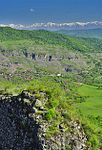| Revision as of 03:43, 23 June 2012 editSprutt (talk | contribs)662 editsNo edit summary← Previous edit | Revision as of 03:46, 23 June 2012 edit undoSprutt (talk | contribs)662 edits more refNext edit → | ||
| Line 40: | Line 40: | ||
| The fortress was an important fortification of the medieval Armenian ] <ref>Bonnie Marshall. The Flower of Paradise and Other Armenian Tales (World Folklore Series). 2007. photo section</ref> and is located at a height of more than 1700 metres, surrounded by vertical cliffs with the heights of 50–60 metres, has a hard-to-reach entrance from the southern part. During its history the fortress has never been taken by storm. Parts of the defensive walls remain standing.<ref>Boris Baratov. Paradise Laid Waste: A Journey to Karabakh, Lingvist Publishers, Moscow, 1998, pp. 50</ref> | The fortress was an important fortification of the medieval Armenian ] <ref>Bonnie Marshall. The Flower of Paradise and Other Armenian Tales (World Folklore Series). 2007. photo section</ref> and is located at a height of more than 1700 metres, surrounded by vertical cliffs with the heights of 50–60 metres, has a hard-to-reach entrance from the southern part. During its history the fortress has never been taken by storm. Parts of the defensive walls remain standing.<ref>Boris Baratov. Paradise Laid Waste: A Journey to Karabakh, Lingvist Publishers, Moscow, 1998, pp. 50</ref> | ||
| The territory of the fortress occupies a large area, though it seems small. Many rooms, secret passages cut into the cliffs, and special “loopholes” for throwing stones at enemies are inside its territory. The water supply problem was solved by a unique method: two rock-cut reservoirs to store rain and melt-water are located in the center of the fortress. Fresh water was brought from a spring at the foot of the mountain. | The territory of the fortress occupies a large area, though it seems small. Many rooms, secret passages cut into the cliffs, and special “loopholes” for throwing stones at enemies are inside its territory. The water supply problem was solved by a unique method: two rock-cut reservoirs to store rain and melt-water are located in the center of the fortress. Fresh water was brought from a spring at the foot of the mountain. <ref>Brady Kiesling (Author), Raffi Kojian (Author, Editor). Rediscovering Armenia. Publisher: Matit; 2nd edition (June 1, 2005), ISBN-10: 9994101218; ISBN-13: 978-9994101214</ref> | ||
| ==Gallery== | ==Gallery== | ||
Revision as of 03:46, 23 June 2012
| Կաչաղակաբերդ (Armenian for Fortress of the Magpie) | |
 | |
| Location | Nagorno-Karabakh (de jure Azerbaijan) |
|---|---|
| Type | Fortress, in the Principality of Khachen |
| Completion date | IX century |
Kachaghakaberd (Template:Lang-hy) is a mountain-top fortress located in Tartar Rayon according to administrative divisions of Azerbaijan and in the Martakert Province according to administrative divisions of the Nagorno-Karabakh Republic.
Architecture
The fortress was an important fortification of the medieval Armenian Principality of Khachen and is located at a height of more than 1700 metres, surrounded by vertical cliffs with the heights of 50–60 metres, has a hard-to-reach entrance from the southern part. During its history the fortress has never been taken by storm. Parts of the defensive walls remain standing.
The territory of the fortress occupies a large area, though it seems small. Many rooms, secret passages cut into the cliffs, and special “loopholes” for throwing stones at enemies are inside its territory. The water supply problem was solved by a unique method: two rock-cut reservoirs to store rain and melt-water are located in the center of the fortress. Fresh water was brought from a spring at the foot of the mountain.
Gallery
References
- "Качагакаберд".
- "Качагакаберд (крепость)".
- Bonnie Marshall. The Flower of Paradise and Other Armenian Tales (World Folklore Series). 2007. photo section
- Boris Baratov. Paradise Laid Waste: A Journey to Karabakh, Lingvist Publishers, Moscow, 1998, pp. 50
- Brady Kiesling (Author), Raffi Kojian (Author, Editor). Rediscovering Armenia. Publisher: Matit; 2nd edition (June 1, 2005), ISBN-10: 9994101218; ISBN-13: 978-9994101214
See also
| Historical Armenian fortresses and castles | |
|---|---|
| Armenia | |
| Azerbaijan | |
| Turkey | |
| This article has not been added to any content categories. Please help out by adding categories to it so that it can be listed with similar articles. (June 2012) |






